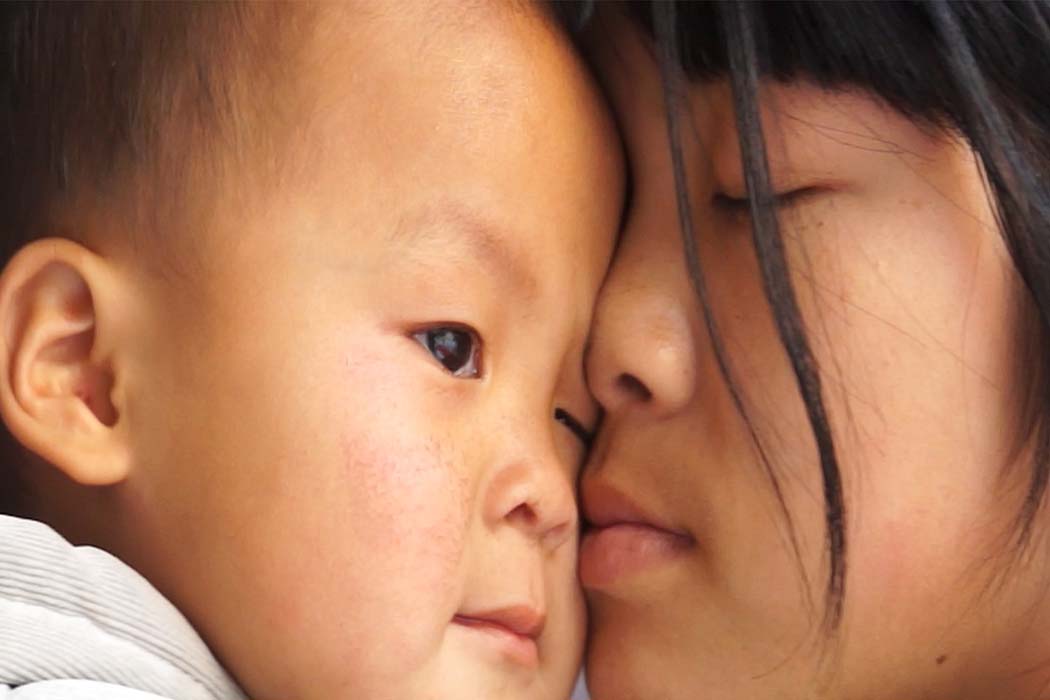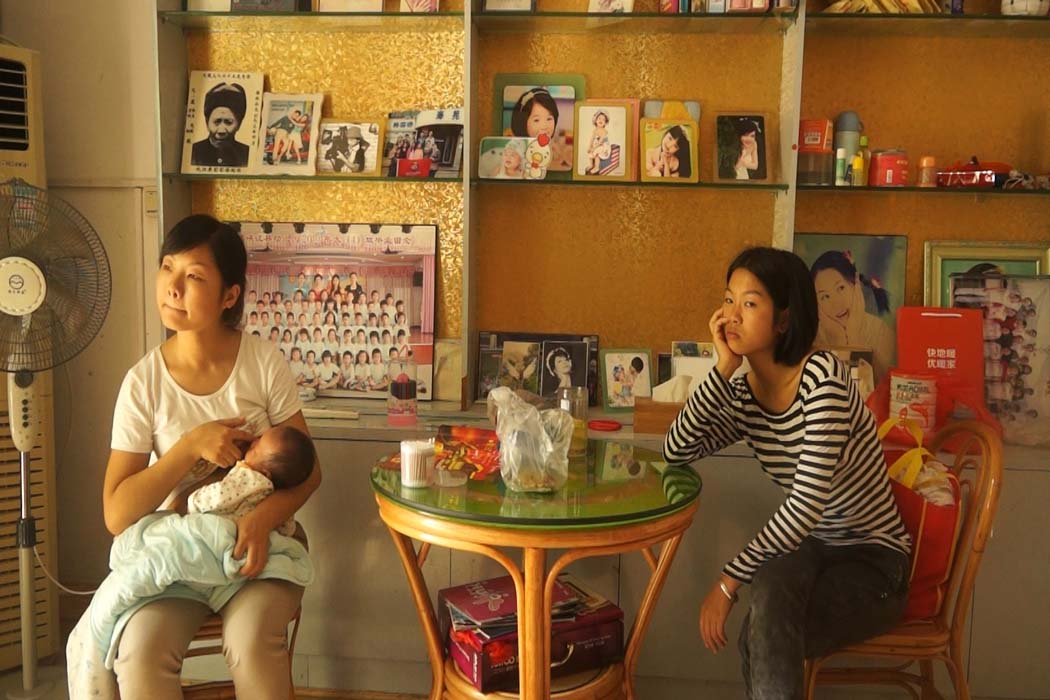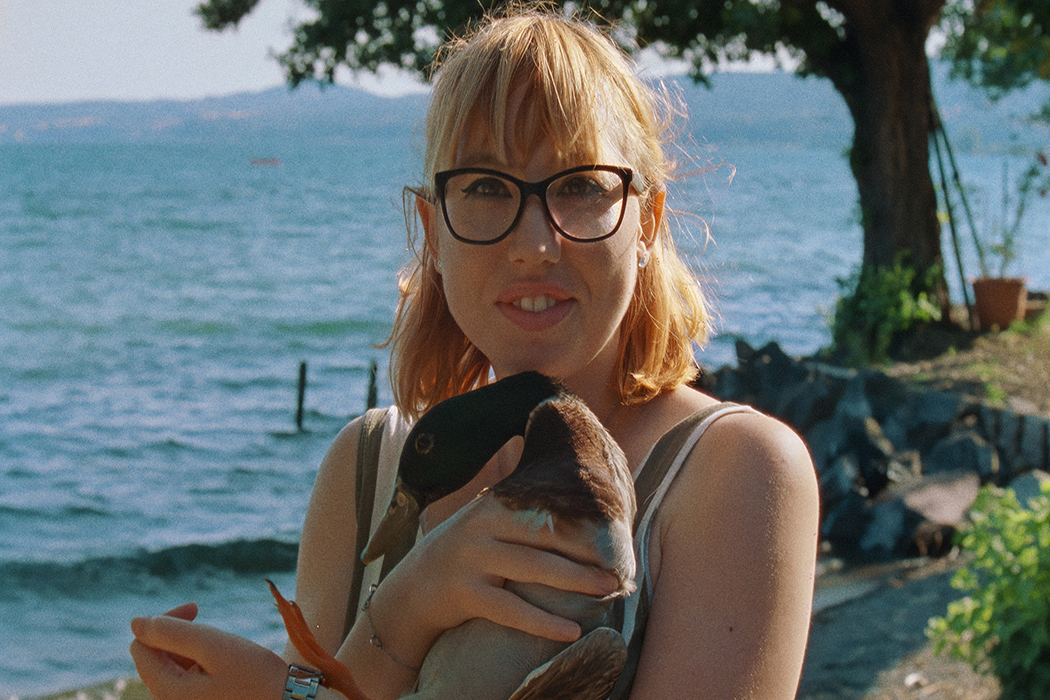
The 59th New York Film Festival, which ran from September 24 to October 10, was back home at Lincoln Center this year, as in-person screenings and talks took over Alice Tully Hall, Walter Reade Theater and the Elinor Bunin Munroe Film Center, along with nearby Damrosch Park. Partner venues, spread across the city and beyond, included Maysles Documentary Center, BAM Cinemas, Anthology Film Archives, Pleasantville’s Jacob Burns Film Center—all of which played selections of the festival’s lineup of narrative and documentary features and shorts, revivals, and experimental works.
This year’s festival poster, designed by artist Kara Walker, shows the silhouettes of two cut-paper female figures gesticulating over something they’re watching on a small mobile phone screen: a humble reminder for a city trying to crawl out of a pandemic and the year we’ve all had, devoid of big screens, devoid of serpentine queues, spent appreciating the micro and valuing the small things that have held each of us through.
In Chinese filmmaker Shengze Zhu’s Berlinale-touring A River Runs, Turns, Erases, Replaces, there is no dialogue. Images captured by the filmmaker of the city of Wuhan, during and after the pandemic, are laid out in reverse chronological order. The past—the truths of the before-pandemic city—emerge, in spurts, from the handwritten text that sometimes overlays the quiet, meandering images of the city. They are letters written to people lost to the pandemic: a partner, a grandmother, a father and a daughter. As the Yangtze River swells up and down, Shengze Zhu’s grieving, meditative gaze becomes a timekeeper, a holder of memories, and a reminder of loss. Yet, in the middle of crippling isolation, the filmmaker’s gaze leaves a promise of regeneration, some semblance of a recovery, and a healing through creating art. Within the course of its 87 minutes, Shengze Zhu and the Yangtze invite us for a swim. As we wade through our own grief and memories, each of us finds a narrative arc to hold onto while we make our way ashore. In the end we find a release in the words of SMZB, Wuhan’s first punk band since 1996: "The city is a big party/ It'll never be over."

The festival’s lineup also included Wang Qiong’s debut documentary, All About My Sisters, which, like Nanfu Wang’s earlier film One Child Nation, looks at China’s One Child Policy but focuses its gaze on the very micro, immediate and indelible scars the policy has left on the filmmaker’s family and the relationships within it. The narrative centers on Jin, the filmmaker’s sister, and their mother’s third child. During the peak of China’s population-control atrocities, a premonition made the mother believe that the child growing inside her was a girl. In spite of an attempted abortion, the girl survived and was left in the woods with a little glucose and formula milk. When her uncle and aunt found her, "She had holes in her feet," but was still alive. While Jin made her way back into Wang Qiong’s family eventually, throughout the film, we see her address her biological parents as "your parents" when speaking to the filmmaker. News of policies and the associated data often numb us to the real lives that lay permanently affected and altered as collateral damage. All About My Sisters concentrates on the psychological damage Jin suffers because of the immense emotional violence that she has been subjected to since her birth by her family who, in turn, are victims of an inhuman State. These toxic circles run deep and eternally as Jin (and Wang Qiong) continually try to break out of them. With filmmakers like Shengze Zhu and Wang Qiong (and Jessica Kingdon and Jia Zhangke), documentaries about China are finally getting to tell the stories of the lives (and deaths) that are often walled off by the postmodern, dystopian monolith of a country our news cycles and older documentaries create for us.
Everyday young people and their stories also find themselves at the center of Pietro Marcello, Francesco Munzi and Alice Rohrwacher’s Futura, in which young people from across Italy speak to the filmmakers about their fears, hopes and dreams. What also emerges is an urgent debate on issues like climate change, nationalism, sexuality, and a growing social inequity. After a year where most of the adults making global decisions have let us down profoundly, there is a flicker of hope that emerges when speaking to a group of giggling young beauty school students in Napoli. Some of them see a future in Italy, some don't; some complain about not being able to travel during the pandemic and some talk about building an environmentally friendly car. "Construction workers work their butts off 12 hours a day," a young boy in Cagliari says as he sits with his soccer teammates. "You should give more money to the worthy, the people who work their butts off. You should give less money to people who practice useless sports!"
I remember these words as I passed by the Alice Tully Hall entrance the evening the Film at Lincoln Center Union members projected the words "NyFilmFest Runs on Union Labor" onto the venue’s roof. Throughout the festival, as FLC workers—programmers, coordinators, editors, marketers, ushers, fundraisers, theater staff—diligently checked vaccine records, reminded audiences to mask up, and took it upon themselves to ensure that NYFF continues to be a safe and joyful experience for filmgoers, they were also demanding a living wage and a fair contract. “We showed you a seat. Help us usher in a fair contract?” asked another projection on the wall.

As a looming IATSE strike threatened to upturn the complacency and status quo with which the world of cinema arts operates, NYFF’s "Cinema's Workers" panel took place in the Elinor Bunin Monroe Center atrium. Among the speakers were film programmer and researcher Abby Sun, Rosa Luxemburg Stiftung's Kazembe Balagun, OPEIU Local 153 organizer Dana Kopel, and filmmaker Ted Fendt, whose film Outside Noise was a part of the festival’s lineup. Fendt also used to work as a projectionist with FLC. The conversation, moderated by Gina Telaroli, one of the festival’s program advisors, brought out the glaring labor inequities that exist not just within a film society as FLC but within the entire ecosystem. Telaroli highlighted the acute lack of solidarity among the workers who keep this "dream factory" well-oiled and running. "How do we stop competing and start cooperating?" she asked as questions of audience’s access to films and events like the NYFF emerged. As Balagun reminded the audience, there are only two movie theaters in all of the Bronx. As the conversation began to ponder over what can be done, it was concluded that the answer, as always, lay in organizing, in the coming together and the "cooperating" that Telaroli alludes to.
One of my favorite watches of the festivals was the 12-minute James Baldwin: From Another Place (1973) by Sedat Pakay, which played as a part of the festival’s Revivals lineup. The film follows Baldwin during his stay in Turkey and captures him talking about observing America’s modernity and power from a distance and reflecting on his own need to stay away from it in order to create and write. "You do what you have to do, the way you have to do it," he says in this black-and-white gem. There is a scene where he describes his work as "bearing witness to something that will have to be there when the storm is over," and I was immediately reminded of something Kopel said on the workers’ panel: "Organizing is lifetime work." It is essentially bearing witness and building something that will outlive us all.
Like the arts, the cinema. And the movements.
Bedatri D. Choudhury is Managing Editor of Documentary magazine. Born and raised in India, she lives in New York City.




